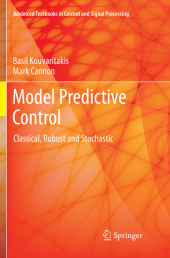 Neuerscheinungen 2019Stand: 2020-02-01 |
Schnellsuche
ISBN/Stichwort/Autor
|
Herderstraße 10
10625 Berlin
Tel.: 030 315 714 16
Fax 030 315 714 14
info@buchspektrum.de |

Mark Cannon, Basil Kouvaritakis
(Beteiligte)
Model Predictive Control
Classical, Robust and Stochastic
Softcover reprint of the original 1st ed. 2016. 2019. xiii, 384 S. 51 SW-Abb., 3 Farbabb., 40 Farbtabel
Verlag/Jahr: SPRINGER, BERLIN; SPRINGER INTERNATIONAL PUBLISHING 2019
ISBN: 3-319-79689-5 (3319796895)
Neue ISBN: 978-3-319-79689-5 (9783319796895)
Preis und Lieferzeit: Bitte klicken
For the first time, a textbook that brings together classical predictive control with treatment of up-to-date robust and stochastic techniques.
Model Predictive Control describes the development of tractable algorithms for uncertain, stochastic, constrained systems. The starting point is classical predictive control and the appropriate formulation of performance objectives and constraints to provide guarantees of closed-loop stability and performance. Moving on to robust predictive control, the text explains how similar guarantees may be obtained for cases in which the model describing the system dynamics is subject to additive disturbances and parametric uncertainties. Open- and closed-loop optimization are considered and the state of the art in computationally tractable methods based on uncertainty tubes presented for systems with additive model uncertainty. Finally, the tube framework is also applied to model predictive control problems involving hard or probabilistic constraints for the cases of multiplicative and stochastic model uncertainty. The book provides:
extensive use of illustrative examples;
sample problems; and
discussion of novel control applications such as resource allocation for sustainable development and turbine-blade control for maximized power capture with simultaneously reduced risk of turbulence-induced damage.
Graduate students pursuing courses in model predictive control or more generally in advanced or process control and senior undergraduates in need of a specialized treatment will find Model Predictive Control an invaluable guide to the state of the art in this important subject. For the instructor it provides an authoritative resource for the construction of courses.
Introduction.- Classical Model Predictive Control.- Robust Model Predictive Control with Additive Uncertainty: Open-loop Optimization Strategies.- Robust Model Predictive Control with Additive Uncertainty: Closed-loop Optimization Strategies.- Robust MPC in the Presence of Multiplicative and Mixed Uncertainty.- Introduction to Stochastic Model Predictive Control.- Probabilistic Invariance and Markov Chains.- Tube Stochastic Model Predictive Control for Additive and Multiplicative Uncertainty.- The Scenario Approach to Stochastic Model Predictive Control.- Closed-Loop Stochastic Model Predictive Control.
"This book is suitable for advanced undergraduate and graduate students as well as professional researchers and academics. ... The book will also be of interest to the practitioners of advanced process control. ... the effort invested in writing this book will certainly be appreciated by its readers. ... I am very happy to encourage colleagues active in conventional, robust, and stochastic MPC to acquire this book for their personal collections and make use of it in their research studies." (Sasa V. Rakovic, IEEE Control Systems Magazine, Vol. 36 (6), December, 2016)
"Model Predictive Control (MPC) is a very popular and successful control technique in both the academic and industrial control communities. ... undoubtedly, MPC should be part of any current modern control course. This book collects together the many results of the Oxford University predictive control group which have been carried out over a long period and have been very influential in stimulating interest in both linear and nonlinear systems." (Rosario Romera, Mathematical Reviews, October, 2016)
"This book manages to provide complete and mathematically rigorous solutions to all the raised problems, under the considered assumptions. In conclusion, the reviewed book is highly recommended to all students (and in particular starting PhD students), researchers and practitioners seeking for a self-standing, clear and mathematically rigorous exposition of the theory and design of classical, robust and stochastic MPC with a linear prediction model structure." (Octavian Pastravanu, zbMATH 1339.93005, 2016)


